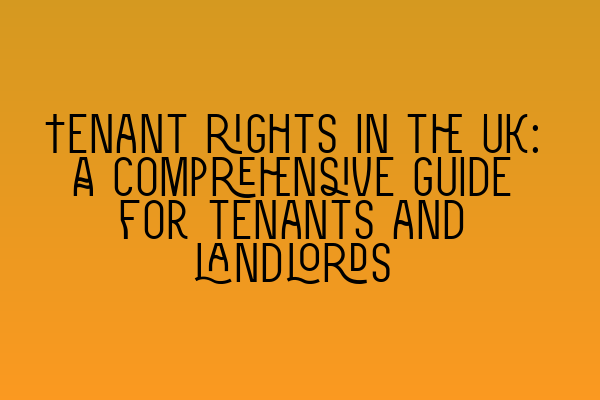Tenant Rights in the UK: A Comprehensive Guide for Tenants and Landlords
Introduction
Renting a property in the UK comes with certain rights and responsibilities for both tenants and landlords. Understanding these rights is crucial for a smooth tenancy and to ensure a positive renting experience. In this comprehensive guide, we will discuss the various tenant rights in the UK, covering key aspects such as security of tenure, rent increases, repairs and maintenance, eviction, and more.
1. Security of Tenure
Security of tenure refers to the legal right of a tenant to remain in their rented property for a specific period of time. The most common type of tenancy agreement in the UK is an Assured Shorthold Tenancy (AST), which offers tenants security of tenure for a minimum of six months. This means that the landlord cannot evict the tenant during this period except in certain circumstances outlined in the Housing Act 1988. To learn more about ASTs and other types of tenancy agreements, check out this article on SQE Property Law.
2. Rent Increases
As a tenant, it’s essential to understand the rules and regulations regarding rent increases. Landlords are generally allowed to increase the rent, but they must follow specific procedures and give proper notice. In most cases, the rent increase cannot happen during the fixed term of the tenancy agreement. However, once the fixed term expires and the tenancy becomes a periodic tenancy, the landlord may increase the rent, usually with at least one month’s notice. Further information on rent increases can be found in this helpful article on SQE Property Law & Land Law.
3. Repairs and Maintenance
One of the key responsibilities of a landlord is to ensure that the rented property is in a good state of repair and fit for habitation. This includes making necessary repairs to the structure of the property, heating and hot water systems, plumbing, electrical wiring, and other essential amenities. Landlords should also carry out regular maintenance to prevent any potential hazards. If the landlord fails to meet their obligations, tenants have various legal rights and remedies. For a detailed overview of repairs and maintenance in tenancy agreements, read this informative article on SQE Property Law.
4. Eviction
Eviction is a serious matter that should be approached with caution. A landlord can only evict a tenant by following the proper legal procedures and obtaining a court order. There are specific grounds for eviction, such as non-payment of rent, breach of tenancy agreement, or expiry of the fixed term. It’s essential for both tenants and landlords to be aware of their respective rights and obligations during the eviction process. To understand the eviction process in more detail, refer to this comprehensive article on SQE Property Law & Land Law.
5. Deposit Protection
In the UK, landlords are required by law to place tenants’ deposits in a government-approved tenancy deposit scheme. This scheme ensures that the deposit is protected and can be returned to the tenant at the end of the tenancy, provided there are no damages or outstanding rent. Tenants should receive information about the deposit protection scheme within 30 days of paying the deposit. For a comprehensive understanding of deposit protection and the legal requirements, check out this article on SQE Property Law.
Conclusion
Understanding tenant rights is crucial for both tenants and landlords to maintain a harmonious and lawful tenancy arrangement. By grasping the key aspects of security of tenure, rent increases, repairs and maintenance, eviction, and deposit protection, tenants can protect themselves and ensure a positive renting experience. Landlords, too, can benefit from knowing their legal obligations and responsibilities, promoting a fair and transparent relationship with their tenants.
For further resources and information on the SQE exams, preparation courses, and exam dates, visit the following links:
– SQE 1 Practice Exam Questions
– SQE 1 Practice Mocks FLK1 FLK2
– SQE 2 Preparation Courses
– SQE 1 Preparation Courses
– SRA SQE Exam Dates
Disclaimer: This article is for informational purposes only and should not be considered legal advice. Seek professional advice for your specific situation.
